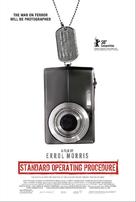Reviews provided by RottenTomatoes
Christy Lemire, Associated Press: As Spc. Jeremy Sivitz puts it with great understatement, 'When you're in war, things change.' Morris forces us to ask ourselves what we would have done in their position, whether or not we like the answer. Read more
Michael Phillips, Chicago Tribune: A misjudged degree of cinematic dazzle obscures the outrages at the core of Standard Operating Procedure, director Errol Morris' first documentary since The Fog of War, and the first Iraq documentary to focus on the infamous Abu Ghraib photo Read more
David Edelstein, New York Magazine/Vulture: See Standard Operating Procedure for its riveting narrative, for the way it keeps looping back -- to the swirls of Danny Elfman's night music -- to the basement of Abu Ghraib. Read more
J. R. Jones, Chicago Reader: This film by the masterful Errol Morris gets closer to the actual events than any of them, with probing interviews of soldiers who were involved and careful scrutiny of the hundreds of photographs retrieved from three digital cameras at the prison. Read more
Jeff Shannon, Seattle Times: Morris explores the reality of Abu Ghraib with a visceral intensity that straightforward reportage could never allow. Read more
Scott Tobias, AV Club: Working from interviews with many of the key players, Morris investigates the Abu Ghraib case with all the rigor of his film The Thin Blue Line, and comes away with an equally convincing argument for miscarried justice. Read more
Ty Burr, Boston Globe: The movie's a staggering work that traces the rotten blossom of this scandal close to its roots. Read more
Kenneth Turan, Los Angeles Times: Focus is really the heart of Morris' unsettling film, which strikes a remarkable balance between art and disturbance, between beauty and pain. Read more
Amy Biancolli, Houston Chronicle: The result is a devastating film, and an important one. Read more
Peter Rainer, Christian Science Monitor: At this late date there is little that is factually revelatory about his film, but as a human document of what people are capable of in wartime, it's indispensable. Read more
Lisa Kennedy, Denver Post: Standard Operating Procedure encourages us not to judge but to try to understand. Or, barring that impossibility, it prods us like the finest documentaries to watch and listen. Read more
Tom Long, Detroit News: Truth is a matter of perspective in director Errol Morris' Standard Operating Procedure, a piercing look at the abuses at Abu Ghraib prison and the aftermath of their discovery. Read more
Owen Gleiberman, Entertainment Weekly: The most chilling thing about the film is how hard it is to completely separate yourself from those guilty U.S. soldiers. Now who in the world would want to go see that? Read more
Jonathan F. Richards, Film.com: Morris offers valuable new perspectives on Abu Ghraib, but the paying customers may not care to go there again. Read more
Amy Nicholson, I.E. Weekly: What's epic in Morris' still and haunting assembly of talking heads is an indictment of photography, and by extension, history. Read more
Rafer Guzman, Newsday: You probably won't find a more illuminating account of what happened within the walls of Abu Ghraib. Read more
Stephen Whitty, Newark Star-Ledger: This film does have Morris' estimable style, grace and control. From the very first moment, as the music starts and the images of Iraq begin, we feel as if we're being led someplace. Read more
Joe Neumaier, New York Daily News: Morris mixes piercing sit-downs with disturbing evidence. Read more
Kyle Smith, New York Post: Those hoping to see Donald Rumsfeld and Paul Wolfowitz - if not President Bush - get a cinematic racking in Standard Operating Procedure are going to be disappointed. Read more
Roger Moore, Orlando Sentinel: Standard Operating Procedure feels like a historical work in progress, brilliant, thought-provoking but incomplete. Read more
Carrie Rickey, Philadelphia Inquirer: Morris marshals the witnesses, demonstrates that photographs are unreliable evidence, and leaves a verdict to the audience. Read more
Roger Ebert, Chicago Sun-Times: Completely unlike anything I was expecting from such a film -- more disturbing, analytical and morose. Read more
Mick LaSalle, San Francisco Chronicle: Morris widens our understanding of the real crimes that took place there. This is where the movie becomes not just a slant on history but also a vehicle for broadening our understanding. Read more
Dana Stevens, Slate: Indisputably an impressive piece of documentary filmmaking. Whether that makes it a great document about what actually happened at Abu Ghraib is a separate question, and one that goes to the heart of Morris' project as a filmmaker. Read more
Minneapolis Star Tribune: Probes deeper than any other Iraq war documentary. Read more
Rick Groen, Globe and Mail: Standard Operating Procedure begins with the terrible volumes spoken by the photos, and then, after interviewing the guilty soldiers holding the camera, it forces us to look outside the pictures' frame to see what is obscured. Read more
Peter Howell, Toronto Star: The singular achievement of SOP is reminding us that truth is always a slippery construct, made all the more so by the fallible human mind and the ever-blinking eye. Read more
Richard Schickel, TIME Magazine: All I am arguing here is that Morris's manner of relating this story is very often quite inappropriate to its substance. Read more
David Fear, Time Out: Standard Operating Procedure never offers concrete answers; it lets the perpetrators explain themselves straight into the camera, and we're left to sift through the testimonies. Read more
Claudia Puig, USA Today: Standard Operating Procedure's subject matter, and what it says about the war in Iraq, is eye-opening. It may be the most disturbing film you'll see in a long time. Read more
Todd McCarthy, Variety: Adds relatively little insight to the public understanding of wayward military behavior. Read more
J. Hoberman, Village Voice: Since The Thin Blue Line's remarkable intervention, Morris's work has grown more public and more problematic -- lofty yet snide, a form of know-it-all epistemological inquiry. Read more

